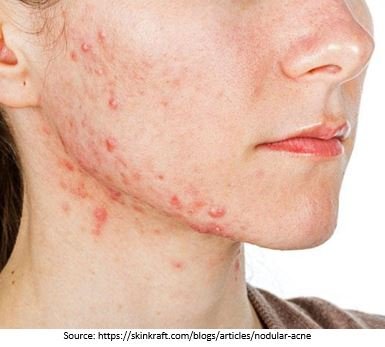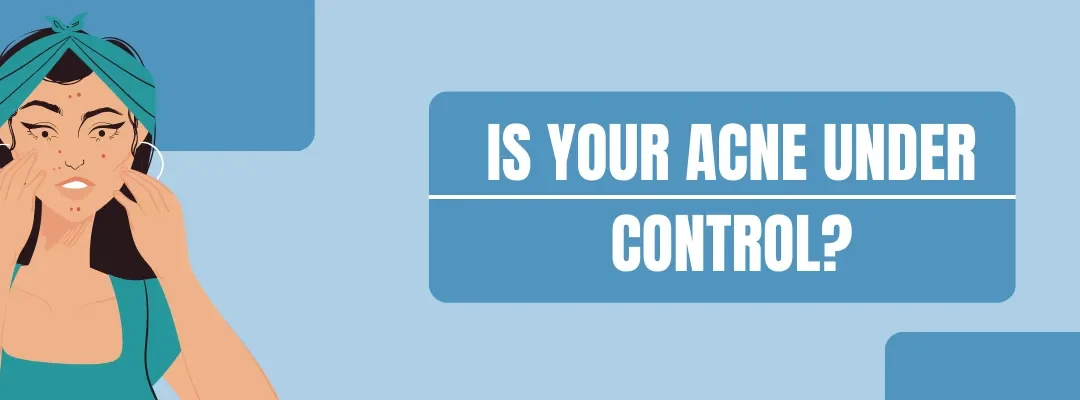Do you ever wonder why your acne reoccurs despite using expensive products and adhering to a strict skincare regimen? It may be different from a typical breakout.
There could be several causes for this skin condition. Alcohol, smoking, stress, unhealthy diet, and lifestyle choices could significantly impact these breakouts. Acne during adolescence was an indicator of upcoming puberty. But if you continue to get breakouts as an adult, it could be concerning.
Although acne may not be a severe medical condition, research has shown that it negatively impacts a person’s emotional health. Both their social circle and their sense of self-worth are reduced. Understanding acne and its causes will help you choose an acne treatment that combines the best products, skincare routine, and lifestyle choices.
It is critical to start treating acne as soon as possible because leaving it untreated might result in scars. Hence, if your acne is not getting better or is very severe and concerning you, you should visit a competent dermatologist in Faridabad like Dr. Archit Aggarwal.
At KDC Clinic, Dr. Archit Aggarwal advises on the most-effective course of action for treating acne breakouts. Based on the client’s skin condition, he strives to provide safe and efficient acne treatment in Faridabad, to control the spread of acne and reduce the appearance of acne scars. The treatment may include medications and/or specific dermatology procedures.
Read this informative article to learn more about acne, its causes, and tips on controlling and preventing them.
What is Acne?

Acne is an inflammatory, persistent skin condition brought on by hormonal changes, bacterial infections, or clogged pores. It frequently affects the back, chest, upper arms, shoulders, and face. Your skin’s surface is home to sebaceous glands, which create too much sebum. The dead skin cells and excess sebum obstruct pores or hair follicles.
The initial mild forms of acne are whiteheads and/or blackheads. Papules, pustules, nodules, and cysts are the symptoms of moderate to severe acne. It is brought on by bacteria that infect the clogged follicles on the skin.
What Causes Acne?
First, it is crucial to identify the causes of acne to control it. The leading causes of acne include:
Hormonal changes:
At the time of puberty, both boys and girls have a sharp surge in androgens. It causes the sebaceous glands to enlarge and produce too much sebum, which results in acne.
Acne can also be brought on by female hormonal changes, especially those that occur during menstruation, pregnancy, or PCOS.
Certain medications:
Acne is also linked to corticosteroids, testosterone, or lithium medications.
- Diet: Acne can be brought on by foods high in carbohydrates or sugar, such as white bread, rice, chips, and soda.
- Stress: Although it doesn’t cause acne, it can worsen them.
- Smoking: According to research, 42% of smokers experience acne, compared to just one in 10 non-smokers.
How to control acne?
Your acne treatment depends on the severity of your acne. However, whether an acne cream or serum, all acne treatments tend to lessen excessive sebum production, prevent inflammation, and reduce acne breakouts.
Dr. Archit Aggarwal, one of the best dermatologist in Faridabad, advises you to follow the below steps to guarantee the success of your acne treatment:
1. Maintain facial hygiene: Our facial skin is vulnerable to excessive heat, light, and pollutants. It needs a good cleanser to eliminate excess oil, debris, and impurities and gently wash pores. Because purifying cleanser contains salicylic acid, which helps prevent acne and subsequent breakouts, we advise using it twice daily. Additionally, it features special skin conditioners to prevent your skin from feeling tight and dry.
2. Tone the skin: Your skin requires toner after cleansing. We advise using purifying toner, an alcohol-free solution enhanced with mandelic acid that gently exfoliates the skin, aids in pore unclogging, and restores the skin’s pH balance. It has ingredients that soothe the skin and help manage excess sebum, leaving your skin feeling relaxed and refreshed.
3. Moisturize the skin: Without a soothing, non-comedogenic moisturizer that is quickly absorbed by the skin, effective acne treatment is incomplete. Hence, you should ask your doctor to prescribe a moisturizer that suits your skin.
4. Consume a healthier diet: You are what you eat. Make sure to consume meals high in dietary fibre, antioxidants, and omega-3 fatty acids. Keep a dietary journal to help identify items that contribute to or exacerbate acne.
5. Sleep well: Maintain consistent sleeping patterns and replace your pillowcase and bed sheet at least once weekly.
6. Avoid touching your face: Every time you touch your face, millions of bacteria are transmitted from your fingers to your face. Do not allow yourself to touch your face.
7. Apply oil-free makeup: Opt for cosmetics that are non-greasy, non-comedogenic, hypoallergenic, and non-irritating. Cosmetics containing glycerine and hyaluronic acid help your skin retain moisture.
If the acne doesn’t improve after your initial treatment, consult your skin doctor to avail more-effective treatment.
How to prevent acne and acne scars?
There are strategies to prevent acne scarring and the development of new acne.
The following steps can help reduce acne and scars:
- Use a gentle soap-free wash, warm water, and a soft facecloth to wash your face twice daily.
- Protect your skin by wearing a wide-brimmed hat and sunscreen whenever you are in the sun.
- Before going to bed, remove your makeup.
- Regularly shampoo your hair if it is oily and rests on your skin.
- Maintain a balanced, healthy diet, and engage in regular exercise
Avoid:
- Oil-based cosmetics or oily sunscreen.
- Using abrasive soaps or often washing your face.
- Wearing restrictive garments over acne-prone regions.
- Using face scrubs and squeezing or picking acne.
Nowadays, most acne cases can be successfully treated. Dermatologists can treat existing acne, stop new outbreaks, and lessen the risk of scarring. Schedule a consultation with Dr. Archit Aggarwal at KDC Clinic if you have any questions or concerns about how to care for your skin.

